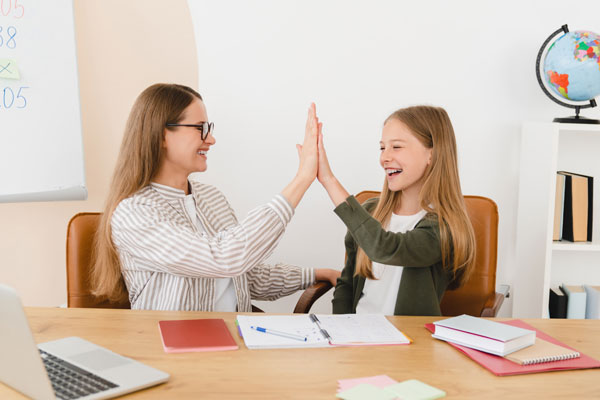The benefits of positive teacher-student relationships are undoubtedly many. One 2022 study found that students who feel cared for by their teacher are more likely to learn. Whether you are a new or experienced teacher, building better relationships with students should be a topic you continually revisit. This post suggests five tips to incorporate into your classroom to create more positive relationships with your students.
1. Take care of yourself
You’ll have tough days just like your students, so give yourself a little grace. Personal and professional issues arise because you are human. If you regularly aren’t feeling excited about the material or interacting with your students, you may be experiencing burnout and may find it difficult to build positive relationships.
On the other hand, if you take care of yourself first, you will be more likely to convey positivity, excitement, and passion toward teaching and towards your students. Your enthusiasm will help students perceive you and the material you present more positively.
2. Active listening
Teachers who are good listeners earn the trust of their students. According to Beth Pandolpho, veteran educator and author of I’m Listening, “We must reconsider the old notion that students must be quiet and listen to their teachers. In order to break through the distraction and noise of their smartphones, we need to listen to them.”
Active listening involves giving a student your undivided attention and focus. Allow ample time before responding to provide the student a chance to add any further detail and complete the thought. Maintain eye contact while engaging in body language, posture, or nonverbal communication to signal you’re actively listening and invested in any issue a student may present.
3. Laughter and the power of humor
Research shows that laughter has physiological, psychological, and sociological benefits. In the classroom, laughter eases tension and creates an environment that’s conducive to learning. Appropriate humor builds rapport with your students, making lessons and assessments less intimidating and fun.
Fortunately, you don’t have to start writing jokes and assembling stand-up routines to replace your lessons. You can employ strategies, including the following activities to build relationships with students:
- put humorous questions on tests
- post funny quotes in the classroom and on the classroom website
- set aside a few minutes to share jokes
- create memes without captions and have the kids add their own
4. Discipline
Establish a social contract for constructive classroom discipline. The disciplinary process can be an opportunity to build stronger relationships with students. That process begins by proactively involving students and working together to establish agreed-upon classroom rules, expectations, and student-endorsed consequences. The resulting social contract gives students a voice in their classroom environment’s management.
By establishing clear guidelines together, students understand what’s expected and will help you by holding each other accountable. Continue constructive discipline by maintaining respect and keeping your cool while addressing disruptive behavior. Losing your temper and responding with anger, yelling, or sarcasm may have the reverse effect, making disruptive students more combative.
5. Student responsibilities
It strengthens students’ relationships with teachers if the students share ownership in their classroom experience. Assigning tasks and leadership roles makes them feel trusted by their teacher. They gain self-esteem and pride in their work.
Create a job board. Delegating small tasks can free up precious moments for teachers to focus on more important items or give extra attention to students who need further instruction. Some ideas include:
- Pass out and collect papers
- Erase chalkboards or whiteboards
- Turn the lights on or off for a presentation
- Nominate a classroom ambassador to show new students the ropes
- Clean up tables and tidy up the classroom
From elementary school staples such as line leader and door holder to calculator distributor, clock-watching timekeeper, or a “DJ” who picks music for class-wide dance breaks, there are lots of opportunities to give students responsibilities that help them feel appreciated as an essential part of your classroom community.
Stronger Relationships, Better Results
Research reveals a significant impact on their ability to learn and stay engaged in their schooling when teachers prioritize strong, positive relationships with their students.
Nurturing strong, authentic, and genuine relationships with students isn’t an immediate exercise or quick fix. Build relationships with students by staying persistent and earning respect over time as a steadily positive influence on their learning. Start a one-week free trial of Avanti today to learn more relationship-building strategies and gain further insight into additional relevant professional development topics.

